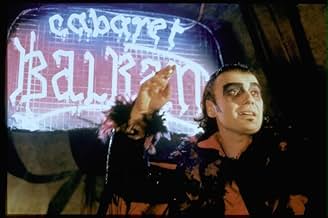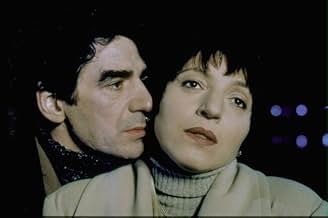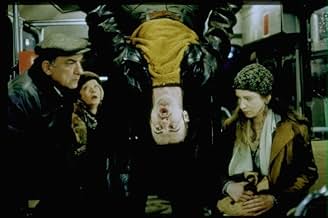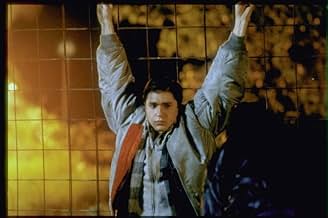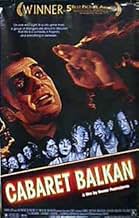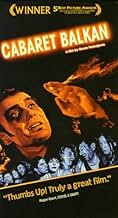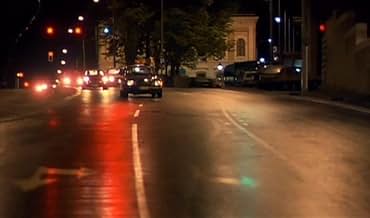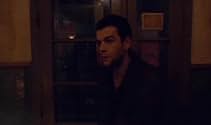IMDb-BEWERTUNG
7,7/10
5856
IHRE BEWERTUNG
Füge eine Handlung in deiner Sprache hinzuRandom Belgrade citizens interact with each other in a night full of crime, frustration, betrayal and revenge.Random Belgrade citizens interact with each other in a night full of crime, frustration, betrayal and revenge.Random Belgrade citizens interact with each other in a night full of crime, frustration, betrayal and revenge.
- Auszeichnungen
- 8 Gewinne & 4 Nominierungen insgesamt
Vojislav 'Voja' Brajovic
- Topi
- (as Vojislav Brajovic)
Predrag 'Miki' Manojlovic
- Mane
- (as Predrag-Miki Manojlovic)
Empfohlene Bewertungen
As truth can be defined by the observer, it is also guided by the artist. This film is as close to truth in film as one can get. The state of the Balkans is one which cannot be easily defined, but understood, if you understand its peoples. The truth of this film lies in the reactionary maelstrom that has been the Balkans for a very, very long time. The film ties the lives together of many, equally bizarre characters and events which are tied together artistically by a collage of madness and life on the edge of it. Please do not miss this film, and watch it several times if possible.
10ereinion
Goran Paskaljevic outdoes himself with this dark, satiric drama-comedy. What he gives us here is Serbia in a nutshell, a post-war Serbia torn with crime, anger and mistrust. "Who's to blame?" is the central question here and the line is spoken several times throughout the movie, once in a particularly hilarious scene. The bus scene is the one that illustrates the situation Serbia and most of former Yugoslavia are in-chaos. There is no one behind the wheel, so everybody is trying to take control.
There is no way to write about this film without saying something about the cast. It consists of all the finest Serbian and Yugoslav actors (two of them, Trifunovic and Glogovac, are from Herzegovina originally and two are from Macedonia) and it is one of the cases where the entire cast is the protagonist. Particularly fine performances come from Miki Manojlovic, Mirjana Jokovic, Mirjana Karanovic, Voja Brajovic, Aleksandar Bercek, Nebojsa Glogovac and Lazar Ristovski. The storyline is incredibly well built and all stories and characters are equally good.
This is a flawless, high quality tragicomedy which will provide you great entertainment and watching experience, as well as a good insight into the situation of this country. It is a humanistic and poignant film with a message, a cry for help. Balkan-a barrell of gunpowder, a-hole of the world.
There is no way to write about this film without saying something about the cast. It consists of all the finest Serbian and Yugoslav actors (two of them, Trifunovic and Glogovac, are from Herzegovina originally and two are from Macedonia) and it is one of the cases where the entire cast is the protagonist. Particularly fine performances come from Miki Manojlovic, Mirjana Jokovic, Mirjana Karanovic, Voja Brajovic, Aleksandar Bercek, Nebojsa Glogovac and Lazar Ristovski. The storyline is incredibly well built and all stories and characters are equally good.
This is a flawless, high quality tragicomedy which will provide you great entertainment and watching experience, as well as a good insight into the situation of this country. It is a humanistic and poignant film with a message, a cry for help. Balkan-a barrell of gunpowder, a-hole of the world.
A great movie. Someone should surely dislike it, but surely it will be impressed in your head and heart like the explosion of millions of bombs...a bang in my heart, absolutely stupend and upsetting...the bombs are inside of everyone, ready to explode and destroy your minds and bodies.
10Zambelli
If you know at least something about the events that took place in former Yugoslavia during the 1990s, you should be able to understand this movie.
Many people have misinterpreted this movie as a vicious depictment of some sick Serbian mentality or an exaggerated vision of a post-war Serbia. None of this is true. The theme of "Cabaret Balkan" is not violence. A great parallel can be made between "Cabaret Balkan" and "A Clockwork Orange". The violence in both movies is not the theme - it's merely an extreme way of proving an important point.
The oppressors and the oppressed. The small fish and the big fish. The dogs and the sheep (rock fans might find interesting similarities between this movie and Pink Floyd's "Animals"). There seems to be certain hierarchy present in "Cabaret Balkan". The passive majority is constantly oppressed by the violent minority, many of whom themselves are victims of "bigger fish". The passive majority is always ready to turn a blind eye, to look the other way or, as a scene from the movie so visually illustrates, sit on a different side of the bus.
Who should the war be blamed on? Is it the government's fault? Or is the fault of the people who elected the government? Should the criminals in power take the blame or the people who let them stay in power? A key scene of the movie which takes place in the bus seems to tell us the most about this issue. "You finally stood up to me", says the young bully to the old man who refuses to play along and answer his insulting questions. In a way, the young bully on the bus is the only real hero of "Cabaret Balkan". He is the only one with the guts to stand up for his rights - everyone else would much rather look the other way, ignore the situation and mind their own business.
The original title of the movie - "Powder Keg", draws its name from an old nickname the Balkan peninsula earned at the beginning of this century - a powder keg ready to explode, with multitudes of people constantly fighting wars, making up, then fighting again. After all, isn't that what all the characters in the movie do? The strange mentality of the Balkan people cannot be easily explained, so director Paskaljevic takes it into extremes and creates extremely surreal scenes, like the one in the boxing ring and the bar. Fight. Drink. Fight. Drink. War. Peace. War. Peace. What's it going to be? Doesn't matter, as long as we're all in "good health".
Many people have misinterpreted this movie as a vicious depictment of some sick Serbian mentality or an exaggerated vision of a post-war Serbia. None of this is true. The theme of "Cabaret Balkan" is not violence. A great parallel can be made between "Cabaret Balkan" and "A Clockwork Orange". The violence in both movies is not the theme - it's merely an extreme way of proving an important point.
The oppressors and the oppressed. The small fish and the big fish. The dogs and the sheep (rock fans might find interesting similarities between this movie and Pink Floyd's "Animals"). There seems to be certain hierarchy present in "Cabaret Balkan". The passive majority is constantly oppressed by the violent minority, many of whom themselves are victims of "bigger fish". The passive majority is always ready to turn a blind eye, to look the other way or, as a scene from the movie so visually illustrates, sit on a different side of the bus.
Who should the war be blamed on? Is it the government's fault? Or is the fault of the people who elected the government? Should the criminals in power take the blame or the people who let them stay in power? A key scene of the movie which takes place in the bus seems to tell us the most about this issue. "You finally stood up to me", says the young bully to the old man who refuses to play along and answer his insulting questions. In a way, the young bully on the bus is the only real hero of "Cabaret Balkan". He is the only one with the guts to stand up for his rights - everyone else would much rather look the other way, ignore the situation and mind their own business.
The original title of the movie - "Powder Keg", draws its name from an old nickname the Balkan peninsula earned at the beginning of this century - a powder keg ready to explode, with multitudes of people constantly fighting wars, making up, then fighting again. After all, isn't that what all the characters in the movie do? The strange mentality of the Balkan people cannot be easily explained, so director Paskaljevic takes it into extremes and creates extremely surreal scenes, like the one in the boxing ring and the bar. Fight. Drink. Fight. Drink. War. Peace. War. Peace. What's it going to be? Doesn't matter, as long as we're all in "good health".
There where at least twenty or more characters who took us through the streets of Belgrade in one crazy soul-searching period. Each character has a destiny to meet and each one affected by the Balkan States of political chaos. While the neighboring states continue to abuse the human condition, our symbolic characters are tearing at each other on the streets of Belgrade, in one form or another. Every character represents a state of nationality or the social mayhem drowning them. There is the two boxing buddies who turn on each other after revealing past truths, (the same as the peaceful neighbors of different nationalities who turn on one another when the war heated up). There is the Taxi driver who took revenge on a police officer, (the power of police enforcement riddles the country with corruption ). The man who returns back home to reclaim his lost love after a five year absence and a pocket full of money, (commenting on people who left the country to make their wealth overseas then coming back to buy their privileges). The young Bosnian Serb refuge who teams up with the underworld to make ends meet because it is the only way to survive in a hopeless situation, (commenting on the power of the underworld, taking control of restless and lost youths with no place to go). There are so many criss-cross factors that director Goran manages to inter-weave them all in a Robert Altman style. There are some tales that take the pleasure away from the more interesting small tales, but each one had to be told so as to cover the whole spectrum of the Balkan States in a sea of frenzy.
Wusstest du schon
- WissenswertesFilmed entirely at night.
- SoundtracksFanfare / Duvacki
Orkestar 'Oluja' Sinisa Stankovica
Top-Auswahl
Melde dich zum Bewerten an und greife auf die Watchlist für personalisierte Empfehlungen zu.
- How long is Cabaret Balkan?Powered by Alexa
Details
- Erscheinungsdatum
- Herkunftsländer
- Offizieller Standort
- Sprache
- Auch bekannt als
- Cabaret Balkan
- Drehorte
- Produktionsfirmen
- Weitere beteiligte Unternehmen bei IMDbPro anzeigen
Box Office
- Bruttoertrag in den USA und Kanada
- 108.103 $
- Eröffnungswochenende in den USA und in Kanada
- 11.774 $
- 25. Juli 1999
- Laufzeit1 Stunde 42 Minuten
- Farbe
- Sound-Mix
- Seitenverhältnis
- 1.85 : 1
Zu dieser Seite beitragen
Bearbeitung vorschlagen oder fehlenden Inhalt hinzufügen


